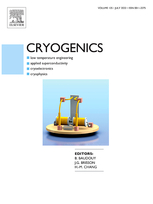
High-critical temperature superconductors for SQUID detection coils.
Author(s) : STEPHENS R. B., FAGALY R. L.
Type of article: Article
Summary
The utility of high-critical temperature detector coils on low-critical temperature SQUID systems has been investigated. Calculations of the effects of flux creep in a typical high-critical temperature coil suggest that such coils operating at 77 K will introduce enough noise into a SQUID detector system to cause problems with the most demanding applications (eg, magnetoencephalography). Operation below 65 K in a magnetically shielded room, or 45 K in the Earth's field, would eliminate the problem. Experimental data suggest the problem is not quite so bad as has been calculated and that the limiting temperatures for biological applications are 80 and 55 K, respectively. Less demanding applications, such as geophysics, could operate with detection coils up to 80 K without noise problems.
Details
- Original title: High-critical temperature superconductors for SQUID detection coils.
- Record ID : 1993-1860
- Languages: English
- Source: Cryogenics - vol. 31 - n. 11
- Publication date: 1991/11
Links
See other articles in this issue (7)
See the source
Indexing
-
Two-hole bulk high-critical temperature SQUID e...
- Author(s) : TAVRIN Y. A., XU Y., BRAGINSKI A. I., HEIDEN C., LINNIK A. S., PAVLIUK V. A., SCHAPOVALENKO V. V.
- Date : 1993
- Languages : English
- Source: Cryogenics - vol. 33 - n. 7
View record
-
Clinical application of a multichannel SQUID ma...
- Author(s) : NAKASATO N., YOSHIMOTO T.
- Date : 1995
- Languages : Japanese
- Source: Cryogenics/ Cryog. Eng. - vol. 30 - n. 11
View record
-
Cooling of SQUID by a Gifford-McMahon cryocoole...
- Author(s) : FUJIMOTO S., KAZAMI K., TAKADA Y., YOSHIDA T., OGATA H., KADO H.
- Date : 1994
- Languages : Japanese
- Source: Cryogenics/ Cryog. Eng. - vol. 29 - n. 4
View record
-
MAGNETOMETER FOR BRAIN RESEARCH.
- Date : 1984
- Languages : English
- Source: Cryogenics - vol. 24 - n. 4
View record
-
Biomagnetic measurement by SQUID magnetometer. ...
- Author(s) : KASAI N.
- Date : 1991
- Languages : Japanese
- Source: Cryogenics/ Cryog. Eng. - vol. 26 - n. 5
View record
